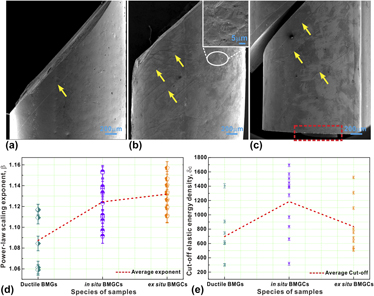Article contents
Stability of shear banding process in bulk metallic glasses and composites
Published online by Cambridge University Press: 12 July 2017
Abstract

The shear-band propagation in bulk metallic glasses (BMGs) during deformation plays a key role in determining their macroscopic ductility. In this work, the shear band propagation during plastic deformation was investigated in the Cu46Zr46Al8 BMG and its in situ or ex situ prepared BMG composites. Compared with the brittle BMG, both types of ductile BMG composites show a more stable shear banding behavior as revealed by a larger power-law scaling exponent obtained from statistical analysis of serrations recorded in compressive curves. A higher cut-off elastic energy density (δc) linked with the multiplication of shear bands is observed for the in situ prepared BMG composites. However, the ex situ fabricated BMG composites show an almost equivalent or slightly larger δc since the dominant shear band but not multiple shear bands mainly governs their deformation. Such observations imply that the shear banding stability of BMGs during deformation is enhanced not only by inducing multiple shear bands but also by obstructing the movement of the dominant shear band at its driven path.
- Type
- Articles
- Information
- Copyright
- Copyright © Materials Research Society 2017
Footnotes
This author was an editor of this journal during the review and decision stage. For the JMR policy on review and publication of manuscripts authored by editors, please refer to http://www.mrs.org/editor-manuscripts/.
Contributing Editor: Mathias Göken
References
REFERENCES
- 9
- Cited by


